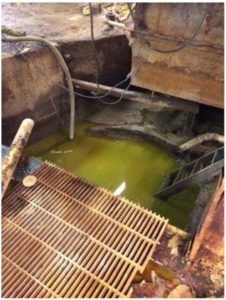The Bullet:
Electro-Plating Services Inc. (EPS), located in Madison Heights, Michigan, was sentenced in federal court in Detroit on November 6, 2019 to five years of probation, and was ordered to pay restitution of $1,449,963.94 joint and several with Gary Sayers to the U.S. Environmental Protection Agency. Sayers, EPS’s owner, was sentenced to one year in prison followed by three years of supervised release. EPS and Sayers pleaded guilty on Feb. 14, 2018 to violating the Resource Conservation and Recovery Act (RCRA).
|
Not sure of your hazardous waste generator status? |
Who:
- Gary Sayers, owner of Electro-Plating Services, Inc.
- Assistant Attorney General Jeffrey Bossert Clark for the Justice Department’s Environment and Natural Resources Division
- U.S. Attorney Matthew Schneider of the Eastern District of Michigan
- Special Agent in Charge Jennifer Lynn of the EPA’s criminal enforcement program in Michigan
What:
- The crime related to Sayers’s operation of EPS, which used chemicals such as cyanide, chromium, nickel, chloride, trichloroethylene, and various acids and bases, as part of the plating process. After these chemicals no longer served their intended purpose, they became hazardous wastes, which required handling in compliance with RCRA.
- Rather than having EPS’s hazardous wastes legally transported to a licensed hazardous waste facility, Sayers stored the hazardous waste in numerous drums and other containers, including a pit dug into the ground in the lower level of the EPS building in Madison Heights. For years, Sayers stonewalled state efforts to get him to legally manage the hazardous wastes. Ultimately, the EPA’s Superfund program spent $1,449,963.94 to clean up and dispose of the hazardous wastes.
- According to court records, Sayers—who owned and was the President of EPS—knew that such storage was illegal and had managed the company’s former Detroit facility where he kept hazardous wastes illegally.
|
Contact me with any questions you may have about the generation, identification, management, and disposal of hazardous waste Daniels Training Services, Inc. 815.821.1550 |
When:
- Starting in 1996, the Michigan Department of Environmental Quality (MDEQ) repeatedly sent Mr. Sayers warnings about his illegal handling of hazardous waste.
- In 2005, Sayers was charged with and pleaded guilty to illegally transporting hazardous wastes in state court.
- During the ensuing years, the MDEQ attempted to get Sayers and EPS to properly manage the amounts of hazardous wastes piling up at the Madison Heights location. The MDEQ issued numerous letters of warning and violation notices to the company regarding its hazardous wastes.
- In 2016, the MDEQ identified over 5,000 containers of liquid and solid wastes at the Madison Heights location. That same year, the city of Madison Heights revoked the company’s occupancy permit.
- In January 2017, the EPA initiated a Superfund removal action, after determining that nature and threats posed by the stored hazardous waste required a time-critical response.
- The cleanup was completed in January 2018.
- Sentencing November 6, 2019.
Where:
- Electro-Plating Services Inc. (EPS), located in Madison Heights, Michigan
Why:
- “This case shows that anyone who chooses to do business with dangerous materials must obey federal laws that protect our fellow Americans and the environment. These defendants’ knowing, illegal storage of waste cyanide, highly corrosive wastes, toxic chromium waste, and reactive wastes posed a significant danger and threat to nearby communities and the environment,”
- “They disregarded the law and numerous warnings and requests by state authorities to comply with their legal obligations. The Department of Justice will act to protect public health and safety.”
How:
- The case was investigated by EPA’s Criminal Investigation Division, the Michigan Department of Natural Resources-Environmental Investigation Section, the Michigan Department of Environment, Great Lakes, and Energy (EGLE, formerly the MDEQ) and the Coast Guard Investigative Service.
- The case was prosecuted by a DOJ litigation team.
|
Like this article? Subscribe to my Monthly Newsletter No marketing emails! |
Conclusion:
The conclusion I draw from this is that you can avoid compliance with the hazardous waste regulations for a long time. From its beginning in 1996 (and I would not be surprised if it started long before that) until sentencing in 2019 is 25 years! Twenty five years of being in business, making a profit, and violating federal and state regulations. I’d like to see a case like this settled long before twenty-five years had passed. I think that persons who deliberately violate the law are few. Many more are those who through ignorance violate a regulation and pay a civil penalty instead of criminal prosecution as in this case.
My training won’t keep you out of jail if you break the law but it can help you learn more about the regulations to which you are subject, and with some effort on your part, keep you in compliance. RCRA training webinars are held regularly and Onsite Training is available.

